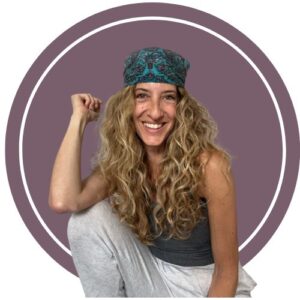
World Mental Health Day – Tuesday, Oct. 10 – is a reminder to all that mental health has become an acute global challenge. In this country alone, more than one in five adults live with a mental illness. The Centers for Disease Control and Prevention (CDC) in Atlanta have also said that more than one in five youths (ages 13 to 18) have had a debilitating mental illness, while one in 25 Americans has a mental illness such as schizophrenia, bipolar disorder or depression.
It’s safe to say that on occasion, many of us have struggled with how to channel and express our emotions in constructive ways. During the pandemic, a Dobbs Ferry resident designed a movement method to do just that.
Jen Aks is a movement expert and dance educator who for 17 years has worked with the National Dance Institute (NDI) – founded in 1976 by then New York City Ballet principal dancer Jacques d’Amboise – to integrate dance into the core curriculum of New York City public schools. (The institute reaches 6,500 New York City students a year and, through 13 affiliates, 100,000 students nationwide.)
In the last five years, Aks has been training teachers to use dance in support of academic work. For NDI in 2019, she produced and directed “Voices of Change,” a multimedia presentation designed to show children that there are many paths to self-expression.
It’s the philosophy that she incorporates as an embodiment coach in her meditative movement method, The Power of Gesture.
She knows just what you are thinking: “When people hear the word ‘dance,’ they get intimidated.” They might be self-conscious about moving their body in a way that’s not associated with physical work or sports; think they have no talent; or believe the arts are inconsequential.
“When the pandemic hit (in 2020), I decided to create a method everyone can use,” she said.
The Power of Gesture is hands-on, so to speak. The participant sits in a chair and – through Aks’ guided meditation, which involves visualization – concentrates on a troubling emotion. The participant then embodies that emotion through hand gestures.
With music playing, the subject moves through the series of hand gestures, releasing negative energy.
As a result, Aks said, “People feel they have a sense of control, instead of being controlled.”
With this new lightness of being, the participant creates another series of gestures that encapsulates self-empowerment.
You can do this in the privacy of your own home on a Zoom call with Aks. But she has also led women’s and children’s retreats and conducted other Power of Gesture workshops in group settings.
“What’s really fascinating and important is to have a group come together, and everyone learns others’ gestures,” she added. “It’s like a piece of choreography. It allows people to ‘hear’ gestural narrative.”
The idea that there are different ways of learning and healing has only been fully embraced by education recently. When Aks was growing up in the cultured township of Montclair, New Jersey, she was ashamed of her inability to process information in the traditional way, through the written page. She could communicate verbally – she’s a fluid conversationalist – and comprehend what she read. But she could not retain it.
“It was very hard for me,” she recalled. “The teachers didn’t notice, and I didn’t raise my hand. I thought something was wrong with me.”

Still, she persisted, studying various movement styles at performing arts schools in Montclair and earning an associate degree from Dean College in Franklin, Massachusetts, and a Bachelor of Fine Arts through the Department of Music and Performing Arts Professions (MPAP) at New York University’s Steinhardt School of Culture, Education and Human Development in Manhattan. But it wasn’t until she was in therapy in her early 20s that Aks met Connecticut professor Katie Woodhouse, who showed her that she was a visual, kinesthetic learner – one who needs pictures, graphs and physical activity to accrue knowledge. (It’s not surprising, then, that she would also gravitate to family and event photography as a way to connect with and portray the human experience.)
“That’s how I learn. That’s what I do. That’s who I am,” she said.
Armed with this insight, Aks realized that she wasn’t unworthy – and she wasn’t alone. People, even those with a great deal of language and/or mathematical skills, use visual and physical cues all the time to process information – setting a difficult text that must be memorized to the melody of a popular song; vacuuming or wood-chopping away anxieties and frustrations. What Aks – who shares her Dobbs Ferry home with her two teenagers, Alex and Naia, and 10-pound rescue dog Sophie – and others like her have done is bring this into conscious effort.
“Movement and dance are about so much more than moving,” she said. “They’re a connection to intuition and wisdom. Guiding people through this has become my life’s work. If I can help them find these connections, I’m happy.”
For more, visit thepowerofgesture.com. Anyone with suicidal thoughts should call the 988 Suicide and Crisis Hotline.
Per your coverage, I wanted to reach out regarding Westchester based Jen Aks – an Embodiment Coach, Dancer, and Expert in the field of communication, who developed The Power of Gesture, a groundbreaking form of moving meditation and gesture to inspire others to connect with your inner emotions through movement, and ultimately reconnect with your mind.
Jen developed The Power of Gesture as a way to help awaken our minds and access the intuitive voices that lie within us. Through a safe and loving space, Jen guides each individual to a state of personal understanding. Each form of movement teaches us that our body has wisdom that can be reclaimed through our ability to shift our mindset to a healthy, empowered, and graceful state.
During the pandemic Jen noticed the disconnect between the body and emotions, so she began a work of embodiment, coaching, and story producing. She used her journey to develop a holistic practice that stood as a universal language that could nurture our emotional well-being by deepening our personal understanding of oneself, and bridging the gap between the mind, body, and soul. Jen uses her understanding of kinetic expression as a way to amplify each individual’s capabilities, and undergo a personal transformation.
The Power of Gesture challenges you to go beyond just words, as you step into the most empowered version of yourself. Through every movement you will create soulful gestures, learn how to shift your mindset, accept ALL parts of who you are, and apply it in your life as you unlock who you were always meant to be.
With that said, I would love to see if Jen may be a fit to share more on her budding company, how she inspires individuals, and discuss how movement can empower mental health. For more on The Power of Gesture, visit: thepowerofgesture.com.





















